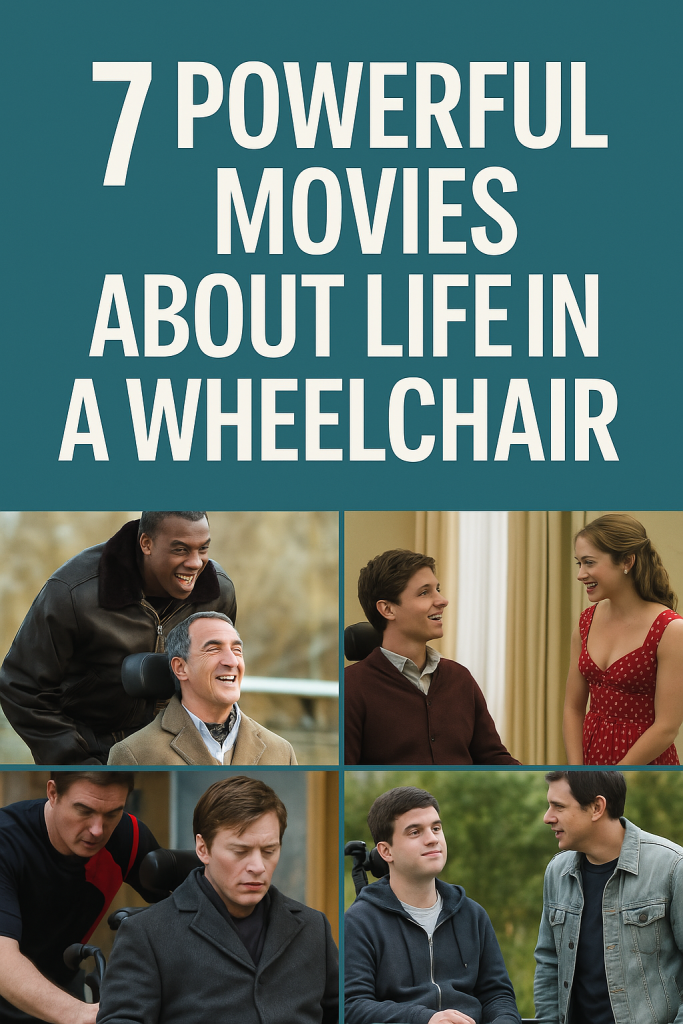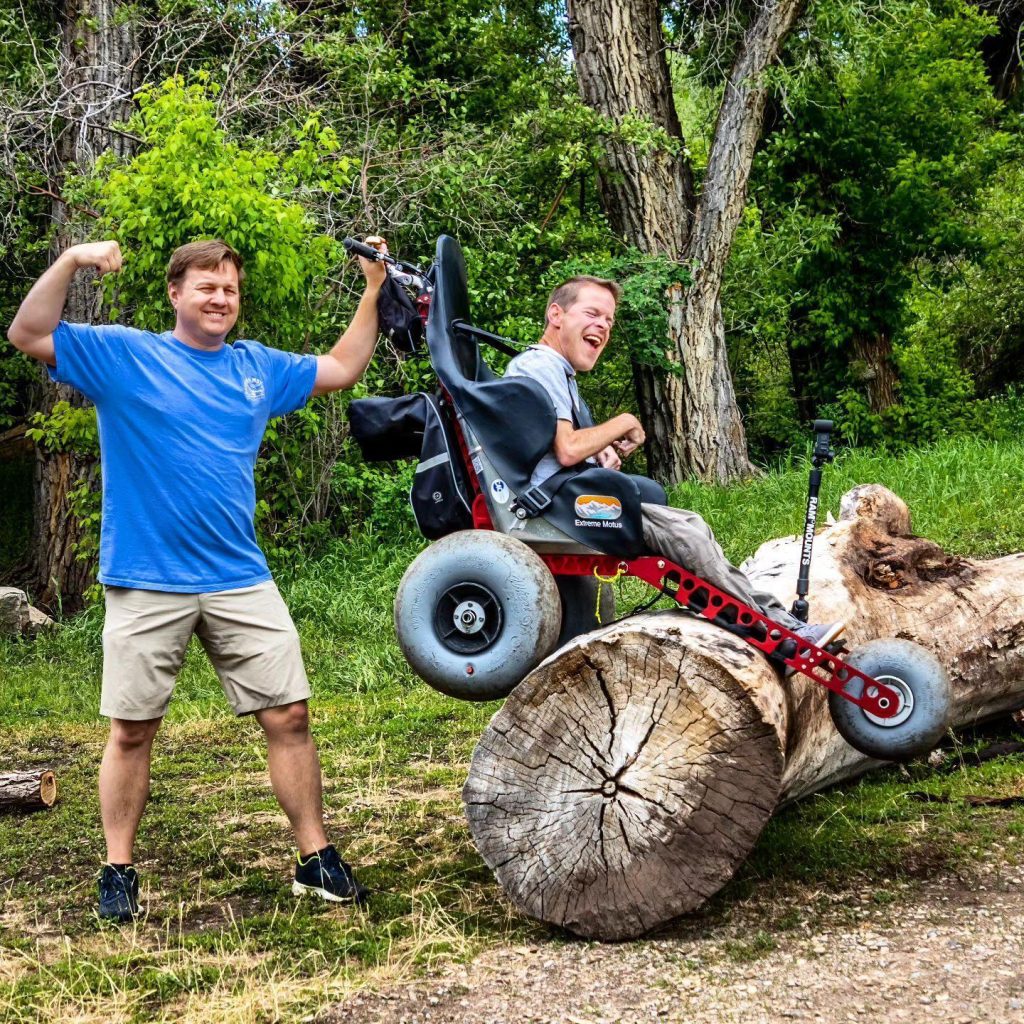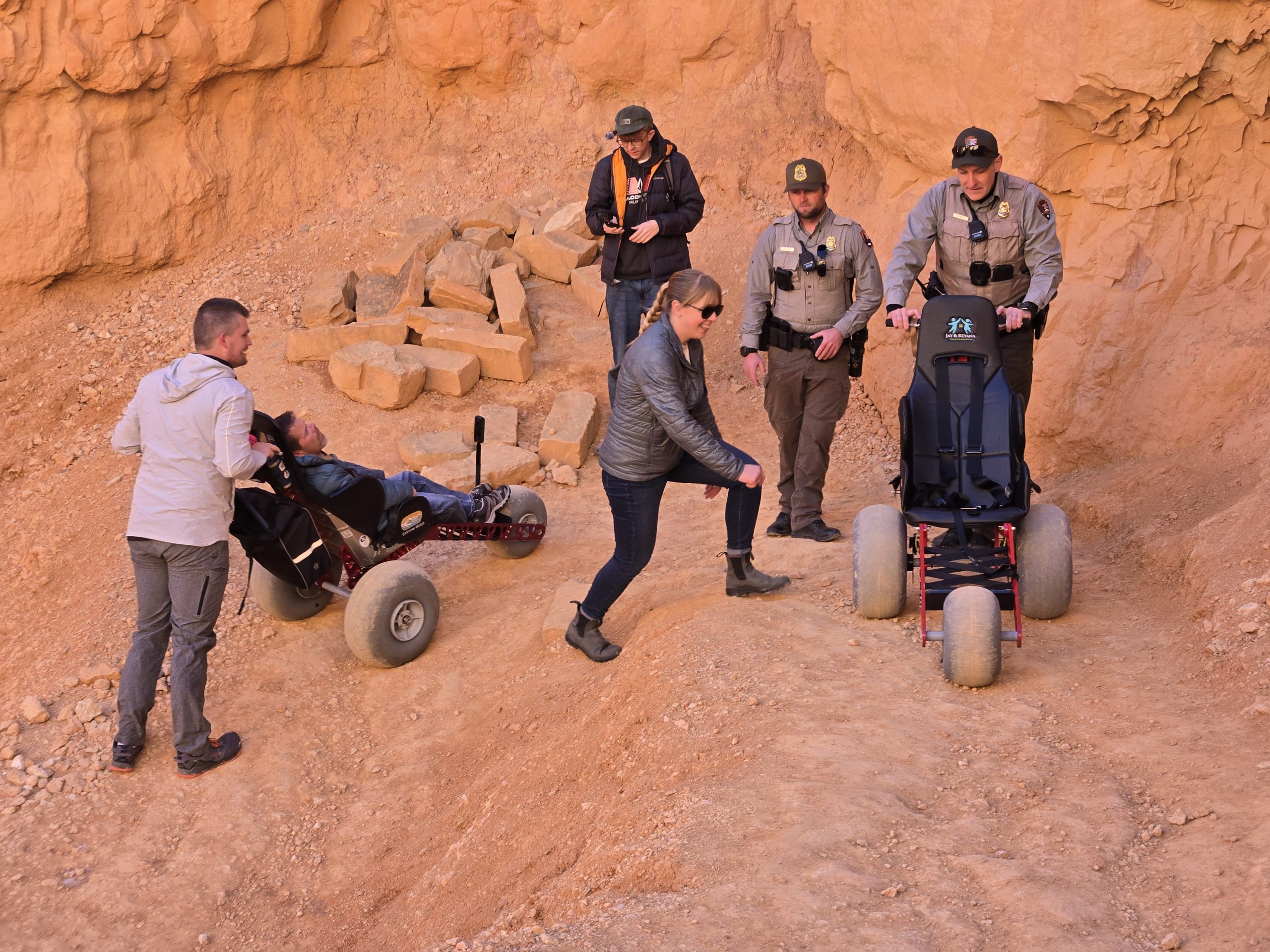7 Powerful Movies About Life in a Wheelchair
Stories of resilience, courage, and transformation often come from the most unexpected places. These incredible movies highlight characters navigating life in a wheelchair—some based on true stories, others fictional, but all deeply moving. Whether you’re looking for inspiration or a new perspective, these films deliver.

7 Movies about Wheelchairs and Disabilities
1. The Intouchables (2011)
Genre: Comedy-Drama
Country: France
Directors: Olivier Nakache & Éric Toledano
Based on: The true story of Philippe Pozzo di Borgo and Abdel Sellou
Plot Summary:
After a paragliding accident leaves wealthy aristocrat Philippe a quadriplegic, he hires Driss, a charismatic man from the projects who has no caregiving experience and only applied for the job to get his welfare benefits. Against all odds, the two form a bond that’s deeply moving and often hilarious. Driss brings spontaneity and fun into Philippe’s structured, somewhat lifeless routine, while Philippe gives Driss a sense of responsibility and purpose.
Why It’s Powerful:
- It’s not a typical “inspiration porn” film — it’s full of humor, heart, and humanity.
- The friendship is the centerpiece, not the disability.
- It challenges assumptions about class, race, and what defines a meaningful life.
- The chemistry between Omar Sy (who won a César Award for Best Actor) and François Cluzet is electric.
Legacy:
Continues to resonate globally as a feel-good story rooted in real-life connection and empathy.
One of the most successful French films ever — it grossed over $400 million worldwide.
Inspired several remakes, including the American version The Upside (2017) starring Kevin Hart and Bryan Cranston.
2. Me Before You (2016)
Genre: Romantic Drama
Director: Thea Sharrock (feature film debut)
Based on: The bestselling novel by Jojo Moyes, who also wrote the screenplay
Plot Summary:
Louisa “Lou” Clark is a quirky, cheerful woman from a small English town who takes a job as a caregiver for Will Traynor, a wealthy young man left paralyzed from the neck down after a motorcycle accident. Will, once an adventurous and successful banker, is now cynical and bitter about his new reality. As Lou tries to bring joy back into his life, an unexpected love story unfolds—but it’s shadowed by Will’s controversial plans for assisted suicide.
Why It’s Powerful:
- It explores complex issues like autonomy, disability, love, and quality of life.
- The emotional connection between Lou and Will challenges the notion that a fulfilling life must look a certain way.
- The film spotlights the emotional and psychological impact of life-altering injury—not just the physical.
Cast Highlights:
- Emilia Clarke (Lou) — bringing warmth, wit, and charm, quite a shift from her Game of Thrones persona.
- Sam Claflin (Will) — nuanced performance showing the internal struggles of someone grappling with disability and despair.
Controversy & Criticism:
- While popular, the film faced backlash from disability rights activists who criticized its message that life with a disability might not be worth living.
- Critics argued it romanticized the idea of assisted suicide and perpetuated harmful stereotypes about people in wheelchairs lacking purpose or happiness.
Legacy:
Despite mixed critical reception, it remains a fan favorite for its emotional resonance and heartstring-pulling narrative.
Sparked global conversations about disability representation in media.
Became a cultural touchpoint for debates on love, dignity, and personal choice.
3. The Theory of Everything (2014)
Genre: Biographical Drama
Director: James Marsh
Based on: Travelling to Infinity: My Life with Stephen by Jane Hawking
Plot Summary:
The film chronicles the extraordinary life of Stephen Hawking, the world-renowned theoretical physicist, focusing on his early years at Cambridge, his groundbreaking work on black holes and cosmology, and his battle with ALS (amyotrophic lateral sclerosis). It’s also deeply rooted in his relationship with Jane Wilde Hawking, his first wife, who stood by him through the early and most challenging years of his illness.
Why It’s Powerful:
- It’s a story of mind over matter — literally. Hawking’s physical decline contrasts with the boundless nature of his intellectual work.
- The film humanizes a scientific icon, showing his wit, charm, and struggles beyond the public persona.
- It offers an intimate look at caregiving, love, and resilience from Jane’s perspective, adding emotional weight and realism.
Performance Highlights:
- Eddie Redmayne (Stephen Hawking) won the Academy Award for Best Actor for his remarkable transformation and portrayal of Hawking’s progression with ALS.
- Felicity Jones (Jane Hawking) received critical acclaim and an Oscar nomination, portraying the emotional and physical toll of being a caregiver and partner.
Representation of Disability:
- Redmayne’s performance was praised for its sensitivity and physical accuracy as the disease progressed.
- The film walks a fine line between inspiration and realism, never reducing Hawking’s life to just his disability.
Legacy & Impact:
- Garnered five Academy Award nominations, including Best Picture.
- Introduced Hawking’s story to a broader audience, especially younger viewers.
- Sparked renewed interest in his scientific contributions and personal philosophy, including his humor and thoughts on mortality.
Famous Quote from the Film:
“However difficult life may seem, there is always something you can do and succeed at.”
4. Murderball (2005)
Genre: Documentary / Sports
Directors: Henry Alex Rubin & Dana Adam Shapiro
Awards: Sundance Film Festival Audience Award, Academy Award nominee for Best Documentary Feature
Plot Summary:
Murderball dives into the intense world of wheelchair rugby, a sport as brutal and fast-paced as any full-contact game—played by athletes with spinal cord injuries. The film follows Team USA as they prepare for the 2004 Paralympic Games, focusing on rivalries, personal struggles, and the sheer athleticism of its players. The title comes from the sport’s original name before it was rebranded as “quad rugby.”
Why It’s Powerful:
- Smashes every stereotype about disability. These men are not fragile—they’re tough, competitive, and passionate.
- It’s not just about sports—it’s about identity, masculinity, trauma, and pushing past limits.
- Gives visibility to life after injury, showing how these athletes adapted and thrived post-accident.
Standout Figures:
- Mark Zupan – The film’s breakout star, known for his intensity on and off the court. Paralyzed after a car accident, he’s the heart of the film.
- Joe Soares – A former U.S. player who controversially becomes coach of Team Canada, creating real-life sports drama.
What Sets It Apart:
- It’s raw and unsentimental—no manipulative music or sugarcoating.
- Shows the players as real people: they drink, joke, curse, have sex, and compete like any other athlete.
- Highlights how people redefine masculinity and strength through adaptive sports.
Critical Praise:
- Roger Ebert called it “one of the best documentaries I’ve ever seen.”
- Widely praised for changing public perception about disability and sports.
Legacy:
Inspired many viewers with and without disabilities to reconsider what “ability” really means.
Still one of the most impactful disability-focused documentaries ever made.
Helped spark broader conversations about accessibility and inclusion in athletics.
5. Born on the Fourth of July (1989)
Genre: Biographical War Drama
Director: Oliver Stone
Based on: The autobiography Born on the Fourth of July by Ron Kovic
Awards: Won 2 Academy Awards (Best Director, Best Film Editing), nominated for 8 including Best Picture
Plot Summary:
This powerful film tells the true story of Ron Kovic, a patriotic young man who enlists in the U.S. Marines and serves in the Vietnam War. After being paralyzed from the chest down during combat, he returns home to a country that’s both politically divided and emotionally distant. Disillusioned and broken, Ron transforms from a war hero to a passionate anti-war activist and disability rights advocate.
Why It’s Powerful:
- It’s not just about war—it’s about what comes after. The trauma, the abandonment, and the fight for dignity.
- The film explores the psychological impact of paralysis and the isolation many veterans face when reintegrating into society.
- Ron’s journey from blind patriotism to vocal activism is emotionally gripping and politically charged.
Tom Cruise’s Breakout Role:
- Cruise gives a career-defining performance, showcasing vulnerability, rage, confusion, and ultimately courage.
- His physical and emotional portrayal of Kovic’s post-injury life—including hospital scenes, substance abuse, and eventual empowerment—was widely praised.
- Earned Cruise his first Academy Award nomination for Best Actor.
Historical & Social Significance:
- One of the first major Hollywood films to highlight the long-term consequences of war, especially for disabled veterans.
- A landmark in the representation of paralysis and disability in cinema.
- Helped elevate national conversations about the treatment of disabled veterans and the failures of the VA system.
Memorable Line:
“People say that if you don’t love America, then get the hell out. Well, I love America.”
This line captures the film’s central theme: patriotism doesn’t mean silence—it can also mean challenging the status quo.
Legacy:
Ron Kovic remains a visible figure in veterans’ rights and activism to this day.
Cemented Oliver Stone’s reputation for bold, politically charged filmmaking.
Inspired greater awareness of the Vietnam generation’s struggles, especially those injured in combat.
6. My Left Foot (1989)
Genre: Biographical Drama
Director: Jim Sheridan
Based on: My Left Foot: The Story of Christy Brown, an autobiography
Plot Summary:
This powerful true story follows Christy Brown, an Irishman born with severe cerebral palsy who could only control one part of his body—his left foot. Despite overwhelming physical limitations and growing up in poverty, Christy defied expectations by becoming a brilliant painter, poet, and novelist. The film traces his childhood struggles, the fierce support of his mother, and his rise as an artist with a uniquely raw and rebellious spirit.
Why It’s Powerful:
- It’s a raw and honest portrayal of living with a disability, without sugarcoating the emotional and physical challenges.
- The story focuses on Christy’s agency, talent, and voice—not just his condition.
- It celebrates human resilience, the power of family, and the drive to express oneself against all odds.
Daniel Day-Lewis’s Iconic Performance:
- Day-Lewis immersed himself in the role, staying in character even off-camera and refusing to break posture throughout filming.
- He won the Academy Award for Best Actor, delivering one of the most respected performances in film history.
- He portrayed both the physical difficulty of Christy’s condition and the sharpness of his intellect and temper.
Brenda Fricker’s Role:
- She played Christy’s devoted and determined mother, winning the Oscar for Best Supporting Actress.
- Her character is a pillar of strength, refusing to let her son be written off.
Themes:
- Art as liberation: Christy found freedom and identity through writing and painting.
- Family and perseverance: His mother’s belief in him shaped his destiny.
- Rejection of pity: Christy is portrayed as proud, fiery, and fiercely independent—not a passive victim.
Legacy:
- Widely regarded as one of the best biopics ever made.
- Helped shift the way disability was portrayed in mainstream cinema—focusing on ability, not just limitation.
- Raised awareness about cerebral palsy and the importance of inclusion and recognition of differently-abled voices in the arts.
Memorable Moment:
The scene where Christy writes the word “mother” on the floor with a piece of chalk clutched between his toes—an unforgettable cinematic moment that captures the beginning of his self-expression.
7. The Fundamentals of Caring (2016)
Genre: Comedy-Drama / Road Trip
Director: Rob Burnett
Based on: The novel The Revised Fundamentals of Caregiving by Jonathan Evison
Streaming on: Netflix
Plot Summary:
Ben, a recently divorced writer coping with personal tragedy, takes a job as a caregiver for Trevor, an 18-year-old with Duchenne muscular dystrophy. Sarcastic and sheltered, Trevor has a strict routine—until Ben convinces him to take an epic road trip. Along the way, they meet quirky characters, face fears, and develop a deep, unlikely friendship that helps both of them heal.
Why It’s Powerful:
- Blends humor and heart while tackling serious themes like grief, disability, and emotional isolation.
- Highlights how caregiving can be a two-way street—both the caregiver and the person receiving care grow together.
- It’s about breaking routines, facing the world, and learning to live fully—even with limitations.
Cast Highlights:
- Paul Rudd (Ben) – Balances comedy and compassion perfectly, showing vulnerability beneath his dry wit.
- Craig Roberts (Trevor) – Sharp, hilarious, and layered performance as a teen who hides insecurity behind sarcasm.
- Selena Gomez (Dot) – A tough, independent hitchhiker who becomes a part of their makeshift family on the road.
Representation of Disability:
- Trevor’s character is written with agency—he’s not defined by his condition, and the story never turns him into a pity figure.
- The film avoids clichés and portrays the challenges of muscular dystrophy realistically while maintaining a light, optimistic tone.
Themes:
- Connection and trust: Both Ben and Trevor are emotionally guarded but slowly let each other in.
- Living beyond fear: Trevor has a list of things he’s afraid to do—and the road trip becomes a journey of overcoming them.
- Humor as coping: The film shows how laughter can be a lifeline during hard times.
Memorable Scene:
Trevor fakes choking at a diner just to mess with Ben—a moment that’s outrageous, hilarious, and deeply revealing of their bond.
Legacy:
Opened up conversations about how we talk about caregiving, especially when both people involved are emotionally wounded.
A fan favorite for those who love heartfelt indie dramedies.
Earned praise for subverting disability tropes with sincerity and sass.
When Will Hollywood Come for Sam & Ryan?

One story that’s just waiting to hit the big screen is that of Sam and Ryan—two friends bonded by outdoor adventures in their Extreme Motus all terrain wheelchair, a sharp sense of humor, and an unshakable drive to live fully. Their journey is the kind of story Hollywood should tell next.
Who are Sam and Ryan?
Sam and Ryan are not biological brothers, but their bond is so strong they might as well be. Brought together by laughter and a shared love for adventure, they’ve formed a brotherhood rooted in loyalty, humor, and pushing each other to live boldly—no matter the circumstances.
Why it deserves the spotlight:
- Their story is raw, funny, and inspiring—real in a way movies rarely show.
- A film could help challenge outdated portrayals of disability and shine a light on independence, friendship, and resilience.
- With Sam and Ryan involved in the process, it could be a powerful step forward for authentic disability representation in media.
So here’s hoping Hollywood sees the potential—and gives Sam and Ryan the platform their story truly deserves.
Every year, more families discover the freedom these chairs create—this Black Friday, demand is already building fast. By joining the early-access list, you secure your chance to order before the sale goes public on November 28, 2025.
Since 2019, Sam and Ryan have been demonstrating that nature is wheelchair accessible with the Extreme Motus All Terrain Wheelchair. From National Parks to Skateparks, their adventures prove that a manual off-road wheelchair can offer laughter and joy while navigating diverse terrains.
Join us as we continue to share these inspiring journeys.

Light, comfortable, and compact, the Extreme Motus glides over sand, rocks, grass, gravel, and even floats in water.
It’s more than a outdoor wheelchair; it’s your ticket to freedom. Embrace the outdoors with confidence, knowing our off-road wheelchair is engineered for durability and ease of use.
Be the first to hear about new gear, upcoming adventures, and exclusive offers. As a welcome gift, enjoy $10 off your first Motus T-Shirt when you subscribe.
By subscribing you agree to receive marketing communications from Extreme Motus, including product updates, promotions, and special offers. I understand I can unsubscribe at any time.



